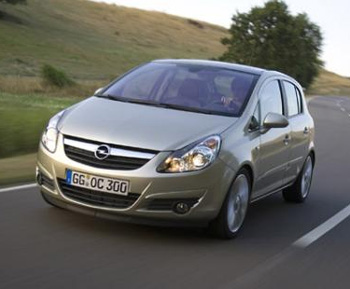 |
|
Marchionne's plans for a new carmaking group
would involve spinning the vehicle making
Fiat Group Automobiles division out of the
Fiat Group and combining it with GM Europe's
Vauxhall, Opel (above, Astra model) and
possibly Saab units, as well as throwing in
the 20 percent stake that Fiat took last
week in Chrysler. |
|
|
|
Fiat CEO
Sergio Marchionne outlined his bold proposals to create
Europe's biggest carmaker to German government ministers
in Berlin yesterday, a plan that will call for 5-7
billion euros in state aid; ministers described his
ambitious plans as being "interesting".
Marchionne's
plans would involve spinning the vehicle making Fiat
Group Automobiles division out of the Fiat Group and
combining it with GM Europe's Vauxhall, Opel and
possibly Saab units, as well as throwing in the 20
percent stake that Fiat took last week in Chrysler. "It
is an interesting approach, without question," German
Economy Minister Karl-Theodor zu Guttenberg told
reporters after his meeting with Marchionne in Berlin
yesterday. He said that the Fiat boss' plans would now
merit further detailed consideration.
With news of
Marchionne's ambitious plans making the top headlines on TV
news channels across the world yesterday, the looming
prospect of a national election in Germany, due in the
autumn, means that job preservation is a sensitive issue for
the government especially as the bulk of the 25,000
Vauxhall/Opel jobs are clustered in Germany (GM Europe also
has plants in Belgium, Spain and the UK). Guttenberg said
that Marchionne has assured him all the German assembly
plants would be safe under his plan though the axe might
fall on an engine and components manufacturing facility near
Kaiserslauten. Guttenberg however admitted in TV interviews
last night that any solution for the future of Vauxhall/Opel
would most likely result in job losses.
The minister
also revealed that Fiat wasn't planning to take on new debt
to created the new carmaking group, instead Marchionne aims
to use the unique opportunity presented by the deep global
financial crisis to take advantage of governments offers of
loans and guarantees. He believes that the new carmaker will
need around 5-7 billion euros in state bridging loans and he
will tap governments for assistance in countries where the
group has factories. Previously the German government has
strongly hinted that it could make some 3.3 billion euros in
loans available to Opel if it can produce a viable plan to
take it forward that will move it away from the current
total ownership of equity by GM. Marchionne would seek other
loans from governments including the UK where GM Europe has
two factories (Ellesmere Port which builds the Astra and a
van making plant in Luton).
Marchionne also
has to win over the unions in Germany; however Opel's labour
union leader Klaus Franz struck a much less belligerent note
yesterday, telling reporters at the Eisenach factory in
Germany that "we will not be hostile to anyone but we will
undertake a very careful risk analysis." In recent days he
had been forthright in his hostility to the Fiat bid.
Marchionne will also have to address the fears of job losses
already expressed by the Italian unions. He has offered to
switch production of Fiat's best-selling Grande Punto
supermini from Italy to Germany in a bid to placant Opel's
unions.
Fiat's closest
rival for a stake in Vauxhall/Opel's future comes from
Canadian-Austrian automotive components and contract
manufacturer, Magna International, which confirmed within
hours of Marchionne arriving in Berlin yesterday that it was
seriously talking to the German government about taking a
stake. Magna, which made a bid to buy Chrysler LLC two years
ago before losing out to Cerberus Capital Management, has
long eyed up becoming a vehicle manufacturer in its own
right. In a statement Magna said that it was talking to
Vauxhall/Opel about "alternatives for the future". However
it sounded a note of caution, saying that: "there is no
assurance that any transaction will result from Magna’s
current involvement." Magna, which reportedly has backing
from a consortium of Russian banks, its seeking a stake in
Vauxhall/Opel rather than making an outright bid for
control.
|